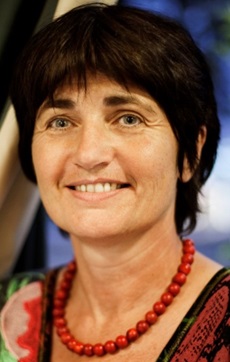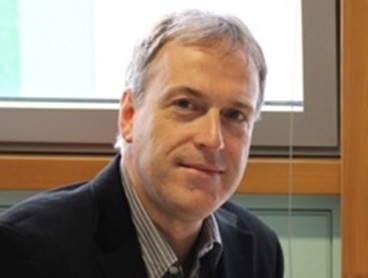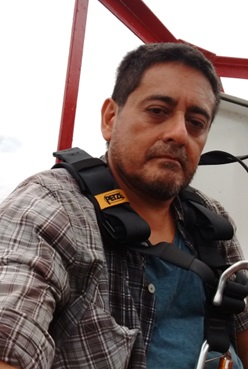
Dennis Baldocchi
Dennis Baldocchi is a professor of biometeorology at the University of California, Berkeley. He and his research group conduct experimental and theoretical studies on the physical, biological and chemical control of trace gas exchange between vegetation and the atmosphere. Goals of work are to predict fluxes of carbon, water and energy, mechanistically, everywhere, all of the time.
Lines of inquiry have been along understanding how fluxes of mass and energy between ecosystems and the atmosphere vary along a spectrum of time and space scales in accordance with structure, function, weather and climate and management. Methods used include use of the eddy covariance method to measure net fluxes of mass and energy across the atmosphere-ecosystem interface. Data are interpreted and distilled through the lens of the CANVEG family of models, physiological measurements at the leaf scale and flux measurements across the soil-atmosphere interface.
His current work focuses on: 1) the roles of management and ecological restoration on greenhouse gas fluxes of crops and wetlands; 2) the impact of weather, climate trends and variability, physiological stress, and structure and function on the greenhouse gas fluxes of savanna woodlands and annual grasslands; and 3) the upscaling and interpretation of fluxes across climatic and ecological gradients with the AmeriFlux and FLUXNET networks.
Prof. Baldocchi has been principal investigator of Fluxnet since 1997 and is co-investigator of Ameriflux. He is a fellow of the American Geophysical Union, recipient of the American Meteorological Society Award for Outstanding Achievement in Biometeorology and a Clarivate Analytics Highly Cited Scientist over multiple years in Agricultural Science and once in Ecology/Environment. He served as Editor in Chief of the Journal of Geophysical Research, Biogeoscience, as subject editor of Global Change Biology and on the editorial boards of numerous other journals. He has served on numerous science advisory panels including the Max Planck Institute for Biogeochemistry and the Department of Energy, Biological and Environmental Research Division.

Angela Gallego-Sala
I am a biogeochemist with expertise in climatic regulation of carbon fluxes in terrestrial ecosystems. My particular area of expertise is peatlands and I have targeted my research to peatlands situated in different climatic zones to build a global perspective. I am also well placed to bridge empirical field/laboratory methods and global modelling. My career aim is to elucidate the unique role of peatlands in the Earth System covering multiple time horizons, e.g. from peat inception and accumulation in the past, through to modern day peatland function and including future predictions to ultimately assess how peatlands may respond and affect climate change, including informing policy and management of these ecosystems. I use a variety of methods in order to achieve this, including gas flux measurements and biogeochemistry, the paleo-record and modelling. I am currently leading an ERC Consolidator grant (TroPeaCC) focussed on tropical peatland carbon cycling. This work complement a NERC funded project entitled: “ICAAP: Increased Carbon Accumulation in Arctic Peatlands”. I am co-I in two other exciting grants: “KaLi: Multiple risks associated with drought and peatland fires in Indonesian Borneo” (GCRF funded) and the peat MOTHERSHIP (a NERC Large grant, led by the Hutton Institute www.peatmothership.org)

Josette Garnier
Josette Garnier defended her Ph-D in Aquatic Ecology and Environment from the University Pierre and Marie Curie (UPMC), together with a certificate in Computing and Applied Statistics in 1982. After a post-doc in UK and France, she was appointed by the National Center of Scientific Research (CNRS) in 1984, got an accreditation to supervise research (Doctorat d’Etat ès Sciences) in 1989. She is presently Research Director at the CNRS with tenure in the field of Biogeochemistry at the Parisian Sorbonne University in France. Since 1997, she leads a research team of Metis Lab and from 2007-2018 she was the head of an interdisciplinary research federation for the environment, gathering 18 laboratories. Since 1989, she has been taken part in an interdisciplinary long term research programme on the Seine River Basin (North of France), strongly impacted by human activity. Anthropogenic modifications of biogeochemical cycles have become a major driver of her research, leading to interdisciplinary collaboration with historians and social geographers as early as 1991. An objective of her projects, besides basic research towards new frontiers of knowledge, is to respond to societal demands such as the reduction of eutrophication, hypoxia, organic and nitric pollutions, and greenhouse gas emissions. She actively participated to the development of a biogeochemical modelling approach of land-to-sea aquatic continua (GRAFS-RIVERSTRAHLER Model) allowing to understand the cause of river and coastal zone eutrophication related to human activities in watersheds, and to co-construct scenarios with policy makers and stakeholders for alternative management options of the water-agro-food systems at the scale of watersheds. She has been PI of 26 National and European projects and supervised 28 Ph-D students. She published about 200 articles in journals indexed in the ISI Science Citation index and 50 book chapters. She co-edited five special issues. She shared the Ruth Patrick award in 2016, with Gilles Billen.

Lulie Melling
Lulie Melling, PhD DJBS FASc is the Director of Sarawak Tropical Peat Research Institute (TROPI) under Ministry of Education, Innovation and Talent Development (MEITD), Sarawak, Malaysia. She received her Bachelor of Science in Geography from University of Malaya in 1990, followed by a Master degree in Agricultural Science with distinction from University of Reading, United Kingdom in 1997. In 2005, she earned her PhD in Agriculture from Hokkaido University, Japan with her project “Greenhouse Gas Fluxes from Tropical Peatland of Sarawak, Malaysia”.
She began her professional career in 1991 as a research officer cum soil surveyor in Soil Management Branch, Department of Agriculture, Sarawak and had ever since gained her expertise in tropical peatland research. Dr. Melling has been renowned both nationally and internationally for her expertise in tropical peatland ecosystem science. Her dedication in her career for environmental management is reflected in her production of exceptional academic achievements, research publications, and sought after involvement in numerous committees and advisory roles. Throughout her 33-year career, she has authored and co-authored over 200 scientific and proceeding papers.
Dr. Melling’s active involvement in wide range of research activities and advisory board distinguishes her as a standout soil expert. Her matrix of expertise encompasses tropical peatland ecosystem science, greenhouse gas flux and climate change, agro-environmental management of tropical peatland, carbon dynamics of tropical peatland ecosystems, and interactions between peatland terrestrial biosphere and the atmosphere. To effectively transfer knowledge and understanding of tropical peatlands to the community, Dr. Lulie has conducted numerous conferences and workshops since 2007. She is also an active member of the Malaysian Soil Science Society (MSSS), Malaysian Peat Society (MPS), International Peat Society (IPS), International Union of Soil Science (IUSS) and AsiaFlux Network Her outstanding achievements and contributions to the field of peat science have earned her numerous awards, further cementing her reputation as a leading expert in her field.

Christoph Müller
Christoph Müller is professor of Soil Science at University College Dublin, Ireland (since 2007) and Professor of Experimental Plant Ecology (since 2009) at the Justus Liebig University, Gießen, Germany. The main research topic are climate impact research with a focus on biogeochemical cycling. Key methodologies are Free Air Carbon dioxide Enrichment studies on grassland, which have been in operation for more than 25 years, and stable isotope ecology where he has developed stable isotope tracing tools to quantify gross transformations of carbon, nitrogen and phosphorous in terrestrial ecosystems. He works as an expert for the International Atomic Energy Agency (IAEA) especially in the training of methods to quantify greenhouse gas emissions and the use of stable isotopes. The research has been published in more than 350 peer-reviewed publications.

Lizardo Fachin Malaverri
Forestry Engineer, studies carried out at the National University of the Peruvian Amazon (Peru) and a master’s degree in Geography at the University of Turku, (Finland).
Work experience in areas such as Remote Sensing, GIS, Spatial Modeling, Dynamics of Land Use and Cover Change, Deforestation Mapping and Assessment of Greenhouse Gases (Eddy Covariance).
Has taken specialization courses in national and international institutions in topics related to academic background with emphasis in the Peruvian Amazon.
Works at the Peruvian Amazon Research Institute (IIAP) as responsible of operations of the Intensive Carbon Monitoring Site – Quistococha. Is also professor at the Faculty of Forest Sciences at the National University of the Peruvian Amazon (UNAP).
